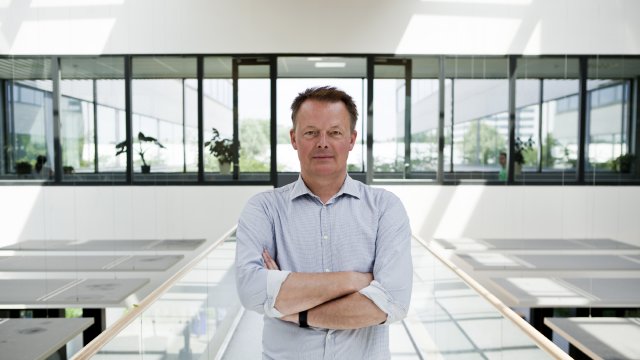Since the start of the pandemic, Belgian researchers and clinicians have been working around the clock to save patient lives. With no standard treatment for COVID-19 patients, these doctors have been initiating different clinical trials to try to find drugs that can help their patients beat the deadly disease.
In Belgium, Prof. Bart Lambrecht (VIB – UGent) has been leading the charge on several trials aiming to repurpose drugs that were initially created for other ailments. The two largest of these trials, named SARPAC and COV-AID, both strive to give patients with hypoxia (a lack of oxygen resulting from damaged lung tissue), a fighting chance of staying out of the ICU.
SARPAC and COV-AID: trials underway
In the SARPAC trial, patients are given an aerosol of Leukine® (GM-CSF) to improve antiviral immunity and help repair damaged lung tissue. In the COV-AID trial, the doctors are testing several medications (tocilizumab, anakinra and siltuximab) typically used to treat rheumatoid arthritis. The hope is that these anti-inflammatory drugs can be used to combat cytokine storms, where patients’ immune systems go into overdrive and starts attacking their own cells, resulting in organ damage and even death.
“COV-AID is unique,” Lambrecht says, “because we’re actually comparing three different types of medications and the synergy between them. These are commercial drugs from companies which would ordinarily never allow a comparison with their competitors’ products. This trial, however, is financed by the Belgian government: we bought the study medication ourselves and can therefore assess all three drugs.”
“For COV-AID [the results are] just spectacular: we’re already seeing huge improvements in our individual patients. The clinical effects are very dramatic.”
Although the final results for the trials won’t be known for a while yet (a few weeks for SARPAC and a few months for COV-AID), the analyses so far have been very promising. Several foreign medical centers, including in the US, France and Singapore, are even launching their own SARPAC clinical trials based on the Belgian team’s protocol.
“It is too early to make a firm conclusion, but we are very optimistic.” Lambrecht says. “For COV-AID it’s just spectacular: we’re already seeing huge improvements in our individual patients. The clinical effects are very dramatic.”
A life saved by a doctor’s blood plasma
Last week, Lambrecht’s team saved the life of a COVID-19 patient who was in a critical condition in the ICU. The virus had been in the man’s body for 25 days and he had been on a ventilator for 14 days. Fearing the worst, Lambrecht decided to try an experimental treatment option that had previously been trialled in China: injecting plasma from a COVID-19 survivor into the patients bloodstream.
They found a willing donor nearer than expected: a UZ Gent doctor who had already recovered from the virus agreed to the procedure. The results were nothing short of remarkable: a mere two days after the convalescentplasma transfusion, the patient no longer needed respiratory assistance. He is now out of the ICU and is recovering rapidly from his ordeal.
“Belgium was already internationally renowned for our clinical trial system… we have been able to approve COVID-19 trials within 2 to 3 days. That speed has been essential.”
Several Belgian medical centers, including KU Leuven and ULiège, have now launched clinical trials to officially test the plasma method with more patients. Lambrecht himself is also initiating several other clinical trials together with Belgian industry partners. These include Zilu-COV: a trial using the UCB medication Zilucoplan that was just launched at UZ Gent.
What sets Belgian trials apart?
With so many patients in need, hospitals around the world are setting up clinical trials testing many different types of treatments. With such a race to save lives, more trials are constantly being initiated.
“There are many overlapping international trials taking place right now,” Lambrecht explained, “because such studies are currently the only way to legally administer these treatments to patients. Without the clinical trials, there is also no reimbursement scheme for the drugs, because they haven’t yet been granted regulatory approval for COVID-19. The slew of data collected from overlapping and complementary trials will however allow for meta-analyses and strengthen the final results, giving us a better grasp of what treatments work best.”
“Another thing that sets Belgium apart is the strong connection between what is being done in the clinical settings and the basic science being conducted in our research institutions.”
According to Lambrecht, Belgium is particularly well positioned for conducting COVID-19 clinical trials:
“Belgium was already internationally renowned for our clinical trial system. For COVID-19 trials, there was an emergency procedure initiated early in the crisis which allows us to approve new trials very quickly. Normally this process takes weeks or even months, but we have been able to approve COVID-19 trials within 2 to 3 days. That speed has been essential.”
Lambrecht also believes one of the strengths of the Belgian trials is that they are very well-backed by basic research.
“Behind the scenes, there’s a lot of data being collected through animal studies to support these trials. It’s another thing that sets Belgium apart; the strong connection between what is being done in the clinical settings and the basic science being conducted in our research institutions.”
Read this previous BioVox article for more on the high cost of clinical trials.
This is a difficult time for most of us, with medical workers working on the frontlines of the pandemic particularly strained. We asked Lambrecht what keeps him motivated through long days in the clinic:
“It’s challenging, but it is also very rewarding. Usually, there’s a separation between your research and the patient, but here you’re seeing the direct effect of your scientific work. It feels good to be able to make a real difference to the patients.
There is an enormous sense of collaboration between the different departments in the hospital: we’re all really working together to save our patients. That sense of comradery is also very gratifying.”
Header image: Bart Lambrecht (© De Tijd).


